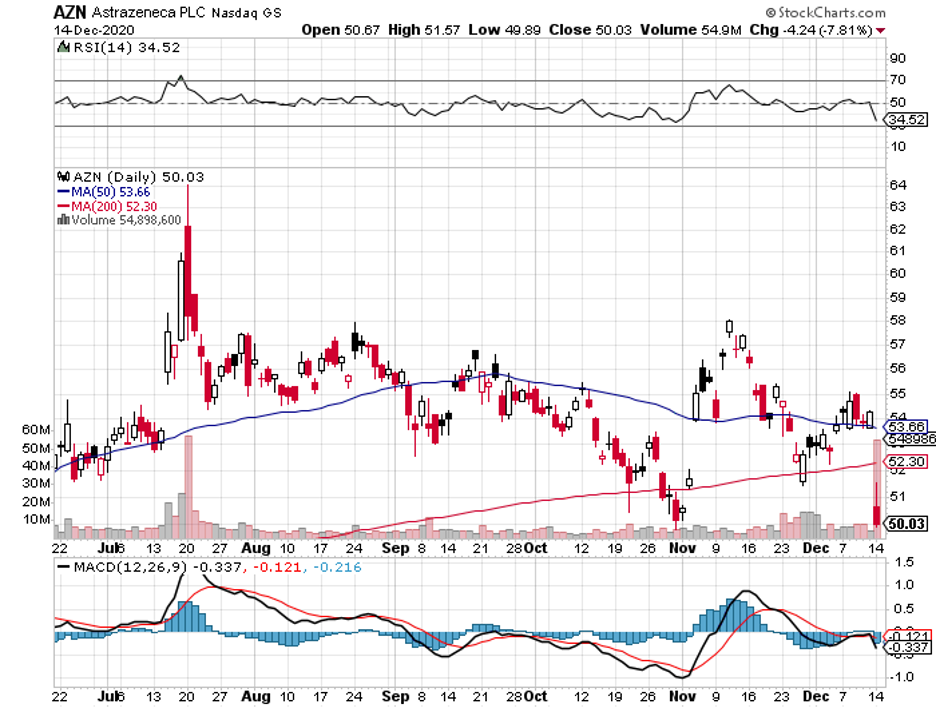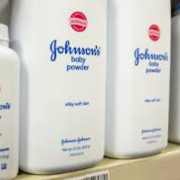Don’t Buy AstraZeneca For Its COVID-19 Vaccine
AstraZeneca (AZN) is one of the leaders in the COVID-19 vaccine race, but you wouldn’t have guessed it by observing the stock price in the past months.
The indifference might be rooted from the company’s recent issues with its vaccine candidate, AZD1222, which includes dosing errors and lack of transparency on their trial data.
In comparison, frontrunners like Pfizer (PFE) and Moderna (MRNA) have been gaining back to back approval from the FDA and even from investors.
Let me tell you why this doesn’t really matter for AstraZeneca anyway.
For one, AstraZeneca won’t even make a profit from its COVID-19 vaccine candidate. In fact, the British drugmaker pledged earlier this year that it will sell AZD1222 at no profit.
So, what is the financial benefit of AstraZeneca’s vaccine?
The potential big win from this COVID-19 program is not from AZD1222 itself, but from AstraZeneca’s long-acting antibody cocktail.
This treatment could be the solution needed to prevent the progression of diseases among patients who are already infected with the virus. It can also be used as a preventive measure, which can last up to 12 months, for those who cannot take a vaccine.
If AZD1222 gains approval, then this COVID-19 vaccine is projected to add $3 billion—an impressive 30%—to AstraZeneca’s 2021 profits.
The approval of this technology would also fall nicely in place with the rest of AstraZeneca’s plans.
Since the start of 2020, AstraZeneca has made it clear that it would start pivoting to focus on rare diseases.
Its latest plan towards developing this expertise is the $39 billion acquisition of biotechnology company Alexion Pharmaceuticals (ALXN).
Here’s the nitty-gritty of this massive merger.
The $39 billion price tag comes in the form of cash and stock, putting each share at $175. Alexion shareholders will get $60 in cash on top of 2.1 AstraZeneca shares for every share they own. Aside from that, Alexion will own 15% of the newly formed company.
If everything goes according to plan, then the deal will be completed by the third quarter of 2021.
This acquisition will significantly expand the R&D programs of AstraZeneca, especially its highly specialized and rare diseases sectors.
This combined company is estimated to rake in double-digit growth in its revenue through 2025, with the company potentially gaining significant synergies of roughly $500 million annually – a fair price that could easily justify the premium price AstraZeneca paid for the merger.
AstraZeneca should also be able to expect double-digit increases in its core EPS accretion for the first three years, with the company realistically anticipating a strong FCF with a strong investment-grade rating.
Now, let’s take a look at what Alexion brings to the table.
Alexion is one of the most promising biotechnology companies to date, which managed to achieve significant growth since its IPO. From 2017 to 2020, the company managed to boost its annualized revenue by 20%, growing from $3.5 billion to $6 billion.
With a market capitalization of $34.21 billion, it has invested a significant part of its budget to the development of rare disease drugs.
The most popular products in Alexion’s portfolio are chemotherapy drugs Ultomiris and Soliris, which generated $4.3 billion in combined sales in 2019 alone.
For 2020, sales of these two treatments are expected to rise by 17% to reach $5 billion.
Prior to this deal with AstraZeneca, Alexion has been engaged in an acquisition spree since 2018.
It managed to snap up four smaller biotechnology companies for $4 billion in total, with its $1.4 billion purchase of Portola Pharmaceuticals as its most recent deal.
Truth be told, the performance of Alexion’s rare disease treatments in the market didn’t skip a beat despite the pandemic in 2020.
In fact, these products have been substantially outperforming expectations that the company itself presented in January.
With this merger, AstraZeneca will gain access to Soliris and its widely successful follow-on medication Ultomiris.
Apart from these mega-blockbuster drugs, AstraZeneca will also get its hands on a handful of treatments for rare metabolic diseases, making the company on pace to rake in roughly $840 million in revenue for this year alone.
With all these plans in place, it’s clear that the strongest reason to buy AstraZeneca is not its COVID-19 program.
Buy this stock for the promising long-term prospects not only for rare diseases, but also for its treatments in cancer, cardiovascular diseases, and even diabetes. Buy it as well for its consistent growth, with the company braving the pandemic headwinds and achieving 10% revenue growth and a 16% jump in core EPS to date.


